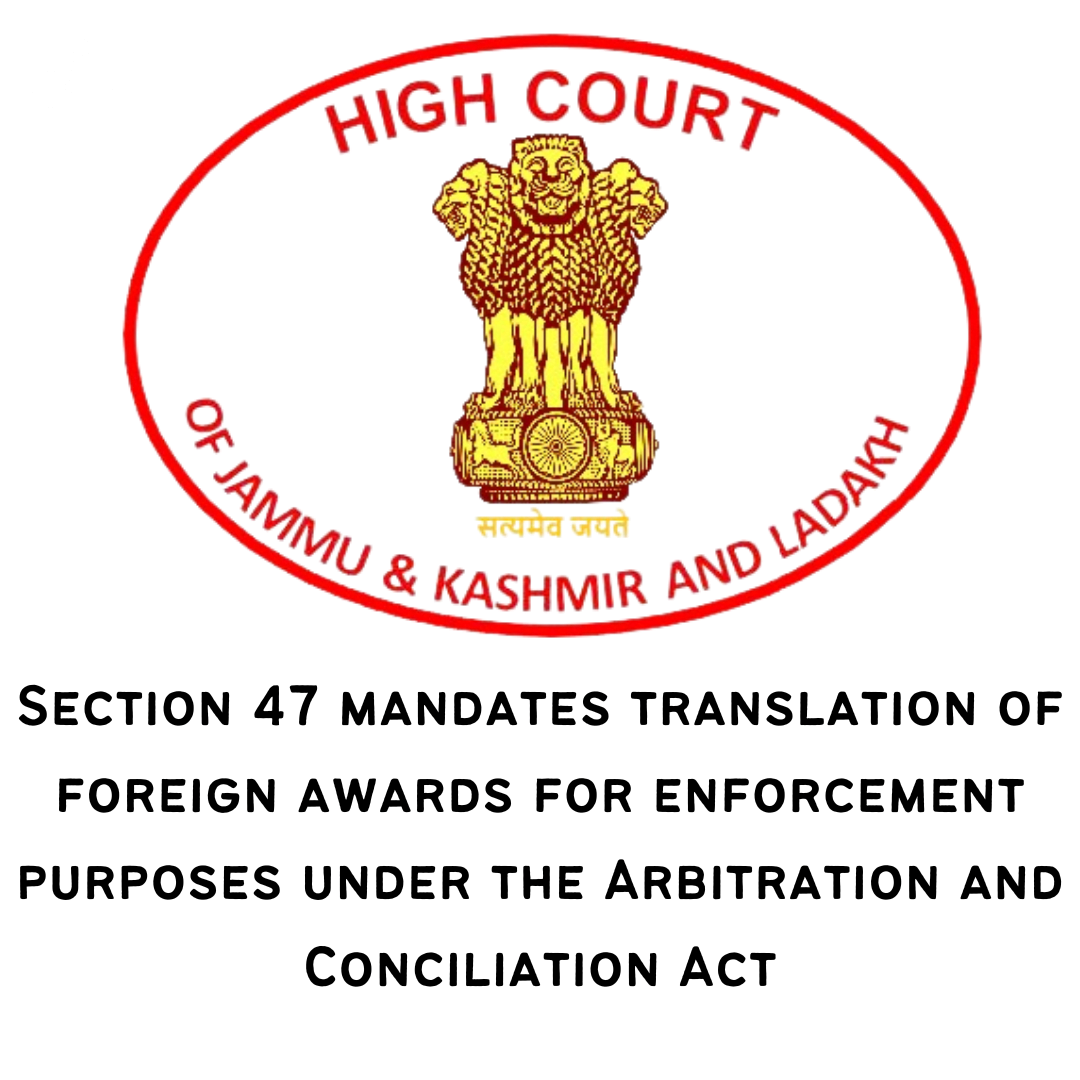The J&K High Court has ruled that submitting an English-translated copy, certified by an official or sworn translator, fulfills the mandate of Section 47(2) of the A&C Act. This section stipulates that in the case of a foreign language award, a translated copy must be filed for foreign award enforcement. The translation should be certified by the Consular or Diplomatic agent of the award holder’s country.
Background: J&K High court Section 47(2) Act is Achieved
The Justice Rajnesh Oswal’s bench applied the essence of Article V from the New York Convention to Article 47 of the A&C Act. The ruling established that an English-translated copy of the award, validated as authentic by a sworn or official translator from the country where the award originated, would adequately meet the requirements of Section 47. This provision is designed to safeguard the integrity of the award and prevent any tampering or distortion of its content during translation into English.
By aligning Article V of the New York Convention with Article 47 of the A&C Act, the court ensured that the translated version, certified by a reputable translator within the award’s home jurisdiction, maintains the accuracy and authenticity of the original content. This legal precedent not only promotes clarity and fairness in cross-border legal matters but also upholds the principles of justice and accuracy in international arbitration. The ruling stands as a testament to the court’s commitment to maintaining the fidelity of legal documents, especially in cases involving international arbitration, where precision and reliability are of paramount importance.
The J&K High Court further ruled that Part-II of the A&C Act, 1996, extended its application to the former State of Jammu and Kashmir. The absence of Part-II from Section 1(2) of the A&C Act did not result in its exclusion from being applicable to the former State of J&K High Court.
The petitioner submitted an application under Sections 47 and 49 of the A&C Act, seeking the enforcement of a foreign award issued on 11.02.2015. This award arose from disputes between the involved parties and was rendered in Germany, in the German language.
The petitioner submitted a translated version of the award, completed by Dr. Ralph A Fellow, an accredited translator certified by the General Federal Ministry of Education and Research in Germany.
Read More:- Delhi High Court favors Himalaya Wellness, grants permanent LIV.52 injunction
Objections Raised by the Award Debtor:
1. Part II of the A&C Act was never extended to the former state of J&K. Section 1(2) explicitly outlined the applicability of only parts I, III, and IV of the Act to the region.
2. Alternatively, if it is assumed that the Act did apply to J&K, the petitioner failed to adhere to the requirements of Section 47(2) of the A&C Act. This section stipulates that an award in a foreign language must be translated and certified by the diplomatic or consular agent of the award holder’s country.

Analysis conducted by the J&K High Court Section 47(2) Act is Achieved
Several key objections raised by the respondent were addressed and ultimately rejected.
Firstly, the objection concerning the non-applicability of Part-II of the A&C Act to the former State of Jammu and Kashmir was dismissed. The court referenced a precedent set by the Supreme Court in the BALCO case, affirming that Part-II indeed extended to the erstwhile State of J&K High Court. This decision served as a crucial foundation for the court’s subsequent deliberations.
Moving on to the objection about the translated copy not being certified by a Diplomatic or Consular agent, the J&K High Court meticulously reviewed the evidence presented. The petitioner had submitted a translation of the award executed by Dr. Ralph A Fellow. Dr. Fellow held certification as a translator from the General Federal Ministry of Education and Research in Germany. The J&K High Court emphasized that the respondent did not challenge Dr. Ralph’s credentials or expertise as a publicly appointed interpreter and translator. Instead, the respondent attempted to exploit technicalities within Section 47(2) in an effort to obstruct and delay the award’s execution.
The J&K High Court made a significant ruling, asserting that the submission of an English translated copy, certified by an official or sworn translator, met the criteria outlined in Section 47(2) of the A&C Act. This section specifically mandates that if an award is in a foreign language, a translated version must be submitted for the purpose of enforcing the foreign award. The J&K High Court decision highlighted the practicality and fairness of accepting translations certified by reputable professionals, ensuring that the spirit of the law was upheld while avoiding unnecessary bureaucratic hurdles.
Crucially, the court drew a parallel between Article V of the New York Convention and Article 47 of the A&C Act. By aligning these provisions, the court established that an English translated copy of the award, verified as accurate by a sworn or official translator in the award’s home country, constituted ample compliance with Section 47. This interpretation was pivotal as it prevented any tampering or distortion of the award or its contents during the translation process J&K High Court.
Read More:- Karnataka High Court stated that the criteria for approving an investigation into a public servant
In light of these findings, The Jammu & Kashmir High Court emphatically rejected the objections raised by the respondent. This comprehensive analysis not only resolved the immediate dispute but also set a precedent affirming the legality and adequacy of translations certified by qualified professionals, thereby promoting efficiency and fairness in cross-border legal proceedings.









Leave a Reply